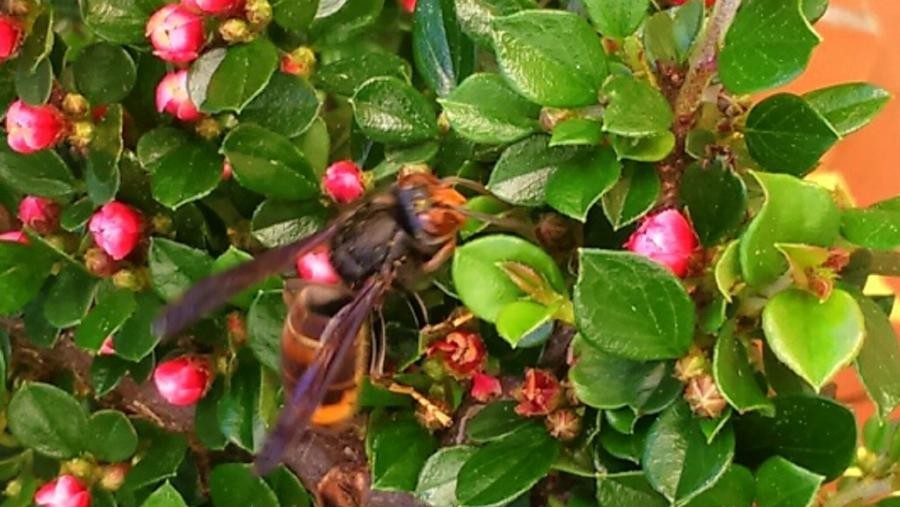The fight against the velutina wasp reduces by 20% the profits generated by beekeeping from the sale of honey

The expenses derived from the application and implementation of prevention and control measures to curb the effects caused by the velutina wasp reduce by 20% the profits generated by beekeeping in Galicia from the sale of honey, according to the conclusions of the economic impact study and ecosystem of this invasive species originating in Asia developed by research staff of the Agro-Food and Environmental Economy, Rural Development and Social Economy (Ecoagrasoc) group at the Higher Polytechnic School of Engineering of the USC Terra Campus.
The research carried out by the EPS professors of Engineering Ana Isabel García Arias and Iban Vázquez González, and the researcher at the same university center in Lugo Mariam Ferreira Golpe, who were part of the USC multidisciplinary team integrated in the Interreg Atlantic Positive project (2019-2023), focused in the analysis of the economic impact and ecosystems of the velutina wasp. Thus, after carrying out a total of 151 surveys of people dedicated to beekeeping in Galicia, they estimated that the control and prevention costs they incurred amount to 2.5 million euros (between 1.8 and 3.3 million with a confidence interval of 95%), with data referring to 2020.
A detailed analysis of the data allows the average cost borne by the nearly 5,000 beekeepers in Galicia to be 561 euros, a figure that varies by province, Pontevedra being the most affected due to its climatic conditions, with an average cost of 1,062 euros per beekeeper , and Lugo, the least burdensome in the reference period, with an expenditure of less than 400 euros. The figures amount to around 500 euros in the case of Ourense to more than 600 in the province of A Coruña, according to the USC Ecoagrasoc group. These variations, they add, place the average cost of the fight against 'velutina' in the Galician community at 13.35 euros per hive during the 2020 financial year.
The study carried out under the Atlantic Positive project, financed 75% with FEDER funds and approved in the second call of the Interreg territorial cooperation program, Atlantic Area 2014-2020 with the aim of curbing 2023), the expansion of this invasive species and minimizing its impact on ecosystems and the socio-economic development of the Atlantic Area, also reveals that trapping was the most widespread method against the velutina wasp. In fact, the expenses arising from the placement of these devices, despite the free traps distributed by the administrations, represent approximately half of the costs assumed by the beekeepers. The cost of the training amounted to 64 euros per beekeeper.
The research staff of the Engineering EPS of the Terra Campus of USC also took advantage of this project to evaluate the incidence of the velutina wasp in the wine sector through a survey of technicians from the different Denominations of Origin (D.O.). The conclusions obtained in this line of research indicate that this invasive species had an earlier presence in the D.O. Rías Baixas, and then gradually spread to the rest of the production areas. The damage increases with each passing year and the pest has a greater presence, stress the researchers, who also emphasize the relevance of bites on the fruit, as they favor the appearance of other diseases.
Projection of results
The results of the work carried out by the USC Ecoagrasoc group under the Atlantic Positive project, led by the Galicia-North Portugal Euroregional Studies Foundation (CEER) and in which ten institutions from Spain, Portugal, France, Ireland and the Kingdom took part United, along with 20 other organizations, will be presented on August 29 at the European Association of Agricultural Economists congress, which will be held in Rennes (France) and, a week later, at the Spanish Congress of Agricultural Economics, which will take place on September 6 in Zaragoza.
At that time, the EPS of Engineering will participate in the meeting in Rennes with the poster 'Economic costs and practices to control Vespa velutina nigrithorax in beekeeping: a survey in four regions in Europe', while this same investment group will present the work a few days later in Zaragoza The economic cost of invasive species: costs borne by Galician beekeepers in their fight against the velutina wasp' and 'Typology of bee farms in Atlantic Europe'.
